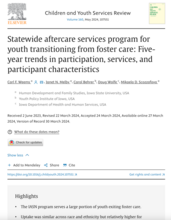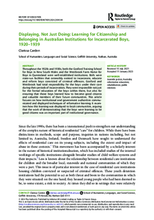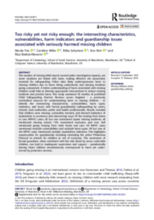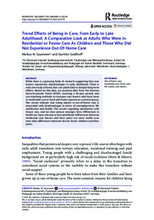Displaying 421 - 430 of 14575
The UN's top court has ordered Israel to enable the unhindered flow of aid into Gaza in order to avert a famine.
The purpose of this study was to examine trends in participation and understand the experiences of youth transitioning from foster care who were involved in the Iowa Aftercare Services Program.
This article focuses on how institutional and government authorities communicated and displayed techniques of reformative learning in New South Wales and Queensland. It examines how this learning was displayed to local communities, arguing that the work of demonstrating that the incarcerated boys in their care were learning to be good citizens was an important part of institutional governance.
This study examined 18 months of published Child Safeguarding Practice Reviews across England to identify the intersecting characteristics, vulnerabilities, harm types, indicators and issues with formal guardianship (safeguarding by carers, schools, local authorities, police and health professionals). Results revealed that children were missing, vulnerable, harmed and showed indicators of exploitation in numerous and intersecting ways.
This article addresses two issues: whether the inequalities faced by cared for children will persist in different stages of their lives and whether these inequalities are dependent on the specific out-of-home care setting, i.e. residential or foster care. The authors examine data from the German Socio-Economic Panel (SOEP), covering a 50-year period.
At the end of 2019, an innovative approach was launched in social work with young people in out-of-home care in Riga. This approach included prevention, changes in the form and methods of social work, and planning for the transition period.
As police and gangs battle it out in the streets of Haiti almost everyday, NBC News' Ellison Barber takes a deeper look into the conditions of orphanages there. The orphanage resides in an area where you don't hear gunfire, and where there is more optimism.
A new report by the UN describes the "outrageous practices" used by gangs in Haiti to brutalise, punish and control the civilian population. It says that the gangs, which are estimated to control more than 80% of the capital, Port-au-Prince, recruit and abuse children, sometimes killing those who try to escape. UN Human Rights chief Volker Türk chief said the situation was "cataclysmic".
On the 27th of March 2024, the UN Independent Expert on Albinism held a consultation workshop on ‘Children with Albinism and the Right to a Family Life’ in preparation for her official report to the United Nations General Assembly (UNGA).
In collaboration with the Transforming Children’s Care Collaborative, the UN Independent Expert on Albinism would like to invite you to attend a consultation workshop on ‘Children with Albinism and the Right to a Family Life’ on Wednesday 27th March 2024 at 16:00 East African Time.





